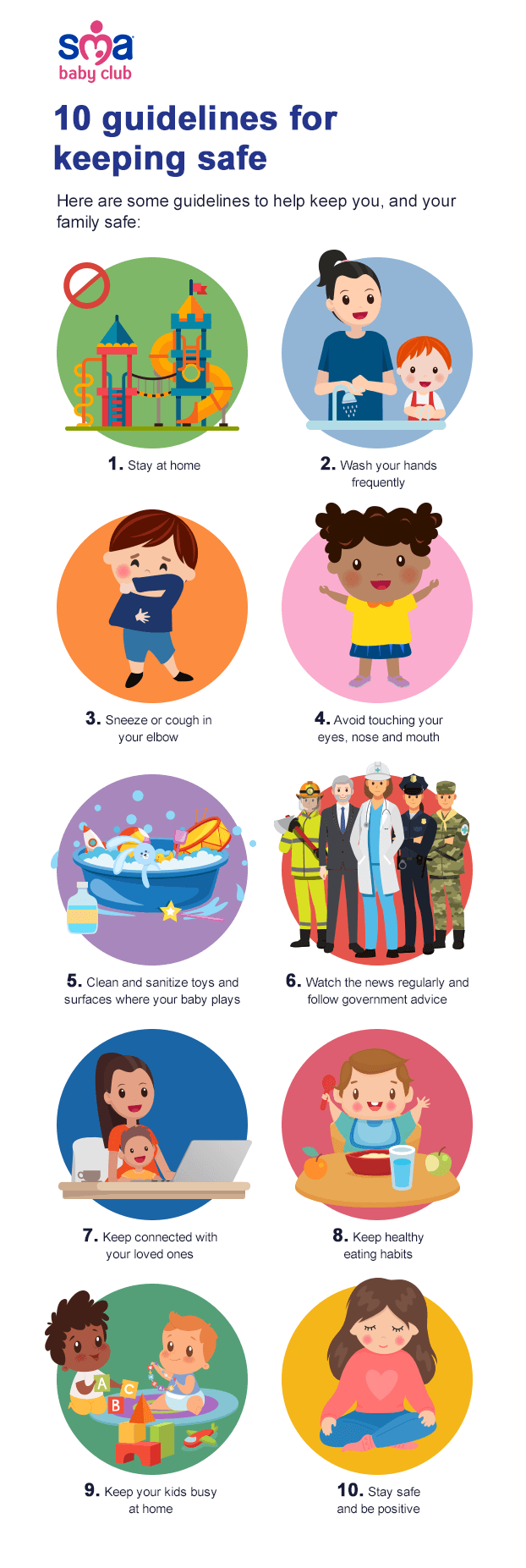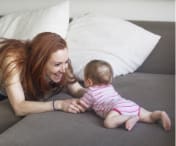Coronavirus COVID-19
Frequently Asked Questions
As you know, we are now seeing increasing cases of COVID-19 and the Government has re-imposed restrictions on our daily lives. We have learned a lot from the experience earlier in the year where there were out of stock issues due to panic buying. We have looked again at our systems to make sure that they are robust and we are able to maintain supply of our products.
In the UK and Ireland, there are strict regulations on baby milks that all manufacturers must adhere to. We comply with all regulations and as such, we are not allowed to send out any baby milks free of charge. We do not currently have an online shop, but we have been working closely with online retailers such as Amazon and Chemist Direct so you can order the product you need direct to your door. Please read our FAQs on product availability for tips on how to find your usual baby milk in your area with our store locator on our ‘where to buy’ tool.
We know how difficult it is for parents to be and new parents during COVID-19 restrictions and we are committed to helping and supporting you as much as possible. We have put together extensive FAQS in line with latest advice on breastfeeding, bottle-feeding, product availability and much more; however, if you have any concerns not covered, please contact our friendly Careline team.
Product availability
-
Where can I find SMA® Nutrition products, if I can’t find any stock in my local area?
Back to top
If for any reason you are struggling to find your usual baby milk, here are some steps that could help:
- For all products (excluding preterm and SMA High Energy®) please use our store locator on our ‘where to buy’ tool. This can be found on the individual product pages of the SMA® Nutrition website. Enter your postcode and it will show regular stockists near you. You should then call the retailer to check on stock availability, before travelling to the store.
- We have worked closely with Amazon, who should have stock, so you can order the product you need direct to your door
- Contact your local pharmacy; they will be able to order baby milk in for you.
- Try an online pharmacy such as Chemist Direct – like Amazon they should have stock, so you can order the product you need direct to your door
- Phone the customer services of your local supermarket for stock information.
- Try independent stores which are often less heavily used
- Ask a friend or family member to keep an eye out for baby milk whilst they are doing their shop
-
Are there alternative products I can use if I can’t get hold of my regular milk?
Back to top
Yes, you will need to talk through the best options, so please call our Careline, who can guide you to the best solution for you.
-
If I have to change to a different milk, will my baby settle ok, what should I expect?
Back to top
Every baby is different and some babies may be slightly more unsettled, this is perfectly normal. A change in stool consistency/frequency can sometimes happen when infants are starting or switching formula, this is also perfectly normal. If you have any questions, contact your healthcare professional or the SMA Careline®.
-
What if my baby is on a specialist milk and I can’t get supplies?
Back to top
On the first instance we would advise to speak to your local pharmacist, they should be able to order your specialist milk in for you. You could also try online pharmacies. If you are still struggling to find your specialist milk please contact our Careline. We are not able to send out product to you as we cannot take payments through our Careline but we may be able to help.
-
If I contact the Careline, can they send me my usual baby milk?
Back to top
Unfortunately not, we have to comply with strict regulations in the UK and Ireland so we are not allowed to send out any baby milks free of charge. Although our Careline is not able to sell you baby milks directly or advise you which shops have stock, you can always contact us and we will do our best to support you. Alternatively you can use our buy now tool on the product pages of the website to find retailers with stock near you.
Coronavirus (COVID-19)
-
Is there anything I can do to protect my baby from catching coronavirus?
Back to top
Naturally, this is a very stressful time for parents; however, there is a lot you can do to help protect you and your baby. The NHS and World Health Organisation (WHO) advise on the following steps:
- Wash your hands with soap and water regularly, for at least 20 seconds. Always make sure you have washed your hands before touching your baby. Use hand sanitiser gel if soap and water are not available.
- Cover your nose and mouth with a tissue or your sleeve when you cough or sneeze. Put used tissues in the bin immediately and wash your hands.
- Try to avoid using public transport unless absolutely necessary.
- Work from home if you can.
- Avoid touching eyes, nose and mouth. Hands can pick up viruses from touching surfaces. So ensure you wash your hands regularly or use a hand sanitiser.
Breastfeeding
-
If I have the coronavirus, can I still breastfeed my baby?
Back to top
Breast milk provides protection against many illnesses and is the best source of nutrition for most babies. If you have the coronavirus you need to consider your own welfare when making a decision to continue or stop breastfeeding. You should speak to your family and your healthcare providers before making the choice and only continue if you feel well enough to do so. There is no clear answer as to whether a baby can catch COVID 19 through breast milk, but the current evidence suggests that it is unlikely. Guidance from the The Royal College of Obstetricians & Gynaecologists recommend the following precautions when breastfeeding:
- Wash your hands well with soap and water for at least 20 seconds before touching your baby, breast pump or bottles
- Try to avoid coughing or sneezing on your baby while feeding at the breast
- It is recommended by WHO that you wear a mask where possible when being close to your baby (including during feeding), but make sure you are aware of how to use and dispose of it safely.
- Follow recommendations for pump cleaning after each use
- Consider asking someone who is well to feed your expressed breast milk to your baby.
- If you do express milk make sure that you and the other person feeding your child both follow the same hand hygiene rules before and after handling any feeding equipment, or your child, and follow recommendations for proper pump and bottle cleaning after each use.
Pregnancy
-
I am pregnant are there specific precautions I should take to prevent catching the virus?
Back to top
You should follow the same precautions as other people, but minimise social contact for 12 weeks. If you start to get any symptoms such as a cough or temperature, follow the advice from the NHS.
-
Can my unborn baby catch the virus from me?
Back to top
If you become infected with Coronavirus there is no current evidence that it will increase your risk of miscarriage or that it will cause problems with your baby’s development. Current evidence suggests it is uncommon to infect your baby during pregnancy or birth*. If your baby does get COVID-19 it is not affected by the type of delivery, feeding choice or distancing, and in all reported cases thus far all newborn babies developing COVID-19 soon after birth have done well. If you are concerned, contact your healthcare professional and follow the updates on this website.
-
Should I still go to antenatal appointments?
Back to top
Current advice from the Royal College of Midwives is to keep going to antenatal appointments. However, you should always contact your healthcare professional for the latest guidance and check updates on this website.
Bottle Feeding
-
I feed my baby with baby milk; can my baby be infected with the virus through the product?
Back to top
We understand that in the current situation many parents will worry about risks of COVID-19 infection in their day-to-day lives. SMA® Nutrition always follow strict protocols on hygiene and cross infection control and ensure that all our baby milks are safe. During this worrying time we have of course reviewed all our protocols and introduced additional measures to ensure our baby milks are safe. Your baby is not at risk of becoming infected with COVID-19 from our baby milks. It is important to follow the same hygiene rules as women who are breastfeeding:
- Wash your hands well with soap and water for at least 20 seconds before you handle the formula or bottle and before you handle your baby
- Ensure you clean/ disinfect any possible contaminated surfaces regularly
- Try to avoid coughing or sneezing on your baby while feeding
- Wash and sterilise all utensils according to manufacturer's instructions
- If you are feeling too unwell to feed your baby, if possible, ask someone else to help you with the feeding duties making sure they still follow the same hygiene rules.
- If you have any of the symptoms of COVID-19 or suspect that you may have it, WHO recommends that you wear a mask, if available, when handling and feeding your baby.
-
Should I sterilise my bottle although the preparation instructions say it is not required?
Back to top
We recommend washing and sterilising all utensils according to manufacturers’ instructions for all First and Follow-on Milks. For Growing Up Milks we don’t usually specify to sterilise equipment but in these unprecedented times we recommend to continue to sterilise bowls, spoons and any other feeding utensils you would usually provide for your baby.
Mental health and wellbeing
Maintaining mental health and wellbeing during a pandemic can be challenging for most people, but it is likely to be even more so for pregnant women and new parents. The most important thing to understand is that you are not alone, and there is plenty of support available for you. Read our FAQs for more tips and advice on managing mental health during this difficult time.
-
How can I protect my mental health during the Coronavirus?
Back to top
Trying to keep on top of everything outside a pandemic can be challenging, so recognising that you’re not superhuman and you can only do so much is the first step. Here are some tips to help:
- Keep a good support network with friends and family and connect regularly, even if it is just via text or video calls for those outside your bubble
- During the winter months try and get as much daylight as possible. If you suffer from seasonal affective disorder (SAD), this is especially important. Consider taking vitamin D supplements during the winter months when we don’t see so much of the sun
- Take care of your body. Try to eat healthily and get regular exercise. Going for a walk is not only great exercise but it will give your brain some space
- Try and reserve a small amount of time for yourself in the evening if you can, to help unwind from the day
- Try mental wellness apps like Headspace or Calm, or try some yoga classes on YouTube
- Take breaks from watching, reading or listening to news stories including those on social media
- Speak to your midwife, health visitor or healthcare professional, they can help you with some of these issues and provide resources
- If you are experiencing anxiety or feeling overwhelmed there are some great tips on the NHS website
- Be kind to yourself, things are very different right now, if you are not doing all the things you normally would in a day or week, that’s ok. You being ok is more important to your baby than cleaning or other things that can wait. Give yourself a break and focus on the little wins.
Further information is also available from the following organisations:
Public Health England – COVID-19: guidance for the public on mental health and wellbeing
NHS – Every Mind Matters
NHS – Mindfulness
Maternal Mental Health Alliance
*Data from The Royal College of Obstetricians & Gynaecologists March 2020
Important notice
The best way to feed a baby is to breastfeed, as breast milk provides the ideal balanced diet and protection against illness for your baby and also many non-nutritional benefits for both baby and mother. We recommend that you speak to your healthcare professional when deciding on your choice of feeding your baby. Professional guidance should also be sought on the preparation for and maintenance of breastfeeding. If you do choose to breastfeed, it's important to eat a healthy, balanced diet. Infant formula is intended to replace breast milk when mothers choose not to breastfeed or if for some reason they are unable to do so. A decision not to breastfeed, or to introduce partial bottle-feeding, will reduce the supply of breast milk. If for any reason you choose not to breastfeed, do remember that such a decision can be difficult to reverse. Using infant formula also has social and financial implications which must be considered. Infant formula should always be prepared, used and stored as instructed on the label, in order to avoid risks to a baby’s health.








